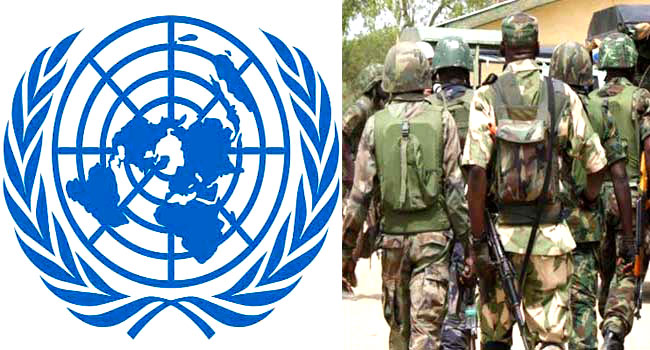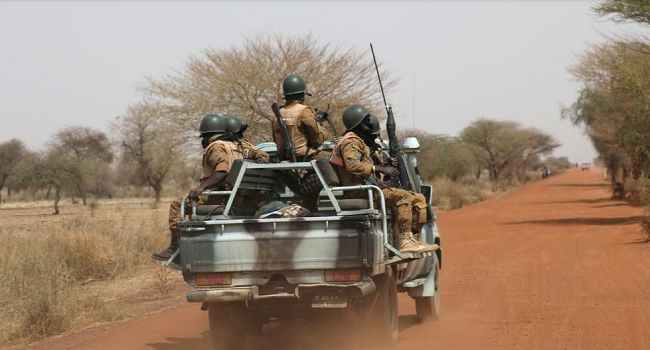The United Nations has advised the Nigerian government to step up its fight against insurgency as military action is not enough to address the situation in the North East.
UN’s Under-Secretary-General for Humanitarian Affairs and Emergency Relief Coordinator, Mark Lowcock, gave the advice in a statement.
The UN humanitarian chief who visited Nigeria recently said he has watched with growing concern the deteriorating humanitarian situation in Borno State.
READ ALSO: Nigeria’s First Female Science Graduate, Deborah Jibowu Dies At 95
He was clear that military and security measures against the insurgents were a necessary and legitimate part of the response led by the government.
He appealed that the military should be cautious in its effort at fighting the insurgents and avoid worsening the condition that the devastated victims had already found themselves in.
Lowcock said, “Military action needs to be proportionate and avoid adding to the plight of civilians, huge numbers of whom have suffered terribly as a result of the actions of the terrorists and insurgents. And military action on its own will not solve this problem.
“It is, therefore, extremely important that the Nigerian Government, including through institutions like the North East Development Commission, is also implementing wider measures to address the root causes of the crisis, relieve humanitarian suffering, and promote stabilisation, recovery, and development. I strongly support these measures.”
Hungry Victims?
The UN humanitarian chief thanked the government and others who between 2016 and 2018 made successful efforts to regain control of areas previously ravaged by the insurgents, leading to the return of more than two million displaced people.
He was, however, worried that no fewer than seven million people currently need humanitarian assistance in Borno, Adamawa, and Yobe states.
Lowcock added that renewed violence, most of it perpetrated by Boko Haram insurgents, has sparked an upsurge in forced displacement in Borno, with more than 140,000 people forced to move in 2019 alone.
He said, “Many farmers have missed multiple planting seasons and more than three million people are food insecure.
“I am glad to have had the opportunity during my visit this week to review the situation with senior figures in the Nigerian government, with the military and other authorities in Borno, with international, national and local NGOs, and others.”
The UN humanitarian chief insisted that NGOs – through their rich networks and capacity to reach people, and their expertise and experience in operating at the community level – have a very important role to play in the fight against insurgency.
He pointed out that the UN and humanitarian partners have supported the humanitarian response in the North East since the beginning of the crisis and have so far provided critical and life-saving assistance to more than 3.8 million people in 2019.
Groups Resume Operation
Lowcock said they have been operating in the most challenging circumstances such that a total of 38 UN and NGO workers, most of them Nigerian, have been killed since 2011.
He added that 10 aid workers have died as a result of violence perpetrated by Boko Haram and other criminal groups in the past 18 months while six others were still missing.
The UN humanitarian chief stressed that all humanitarian organisations working in Nigeria which receive support from the international community have operated in full compliance with international standards, including counter-terrorism related conditions, national laws, and humanitarian principles.
He explained that operating in such a manner was that not only a matter of principle but was required as a practical condition of funding from the major donors.
“It is important to recognise that all the international NGOs working in the North East are authorised to do so through the government registration process and local approvals from the relevant authorities.
“I have received assurances from the relevant authorities that the suspension of the activities of Mercy Corps and Action Against Hunger announced in September will be lifted in the next few days,” he confirmed.
Lowcock believes this will allow an immediate resumption of life-saving assistance to nearly 400,000 people who have been without food and other essential help for the last month.
He said the government also planned in the next fortnight to bring together all the relevant stakeholders, including the UN and NGOs, to discuss the shared challenges in Borno.
“I greatly welcome all this. Enhanced dialogue between the Government and the international community, including international NGOs, in pursuit of the shared goals of bringing peace, promoting recovery, and assisting and protecting innocent civilians in the north-east who have been the main victims of the conflict is in everyone’s interest.
“The UN’s Humanitarian Coordinator, Mr. Edward Kallon, and his team based in Nigeria remain at the disposal of the Government and others in support of those goals,” Lowcock added.





